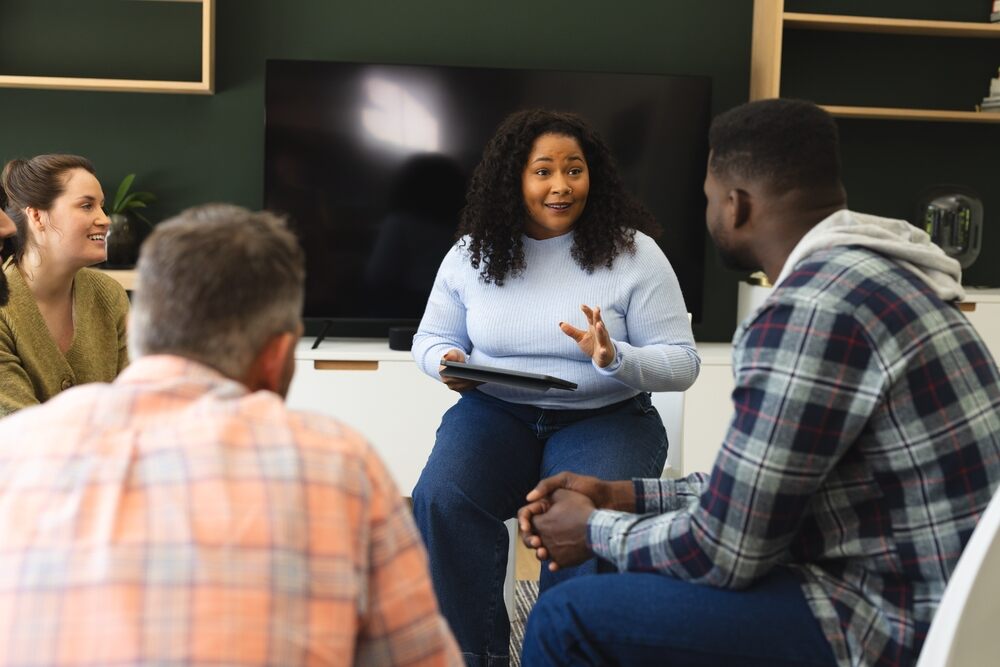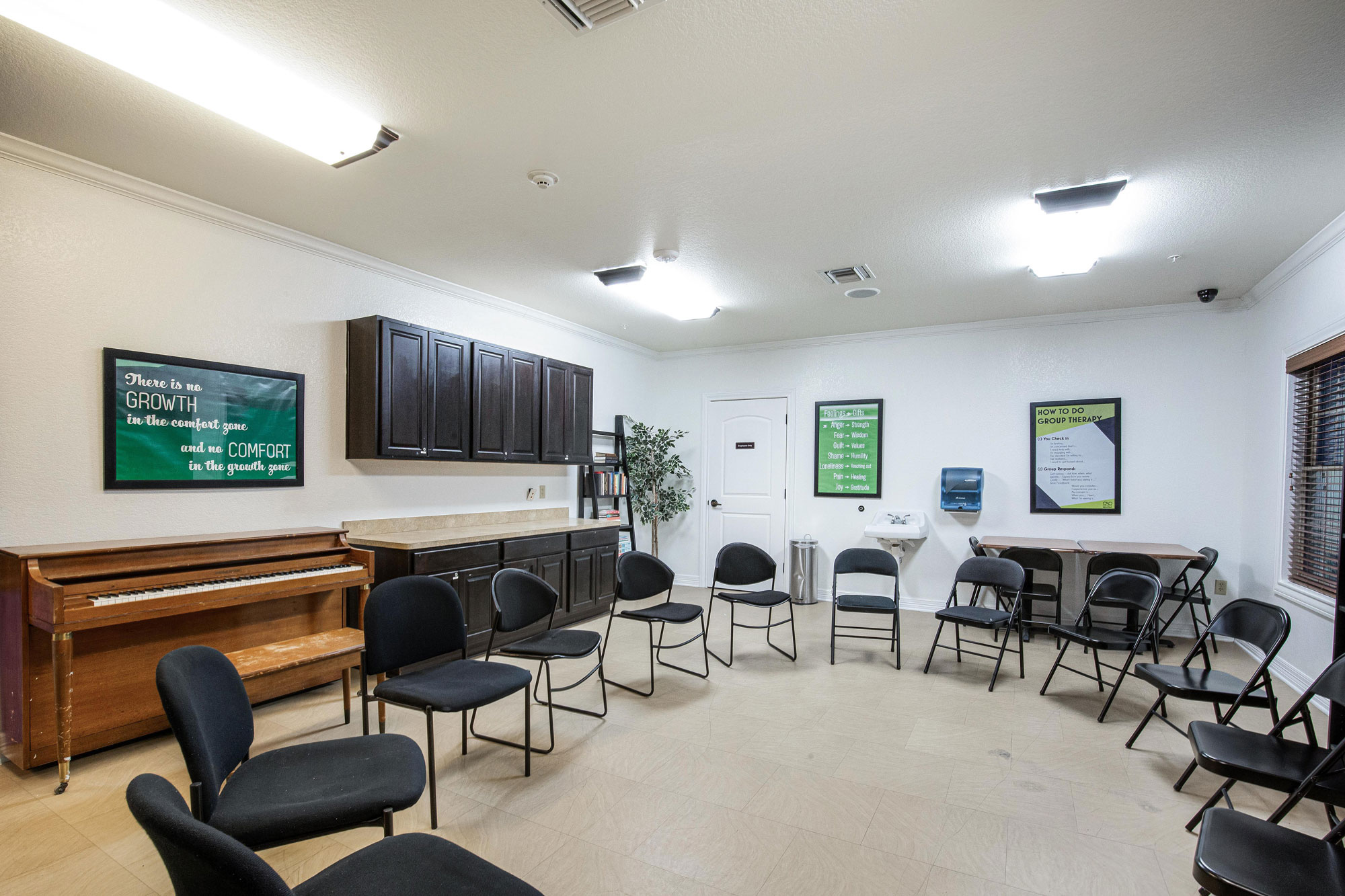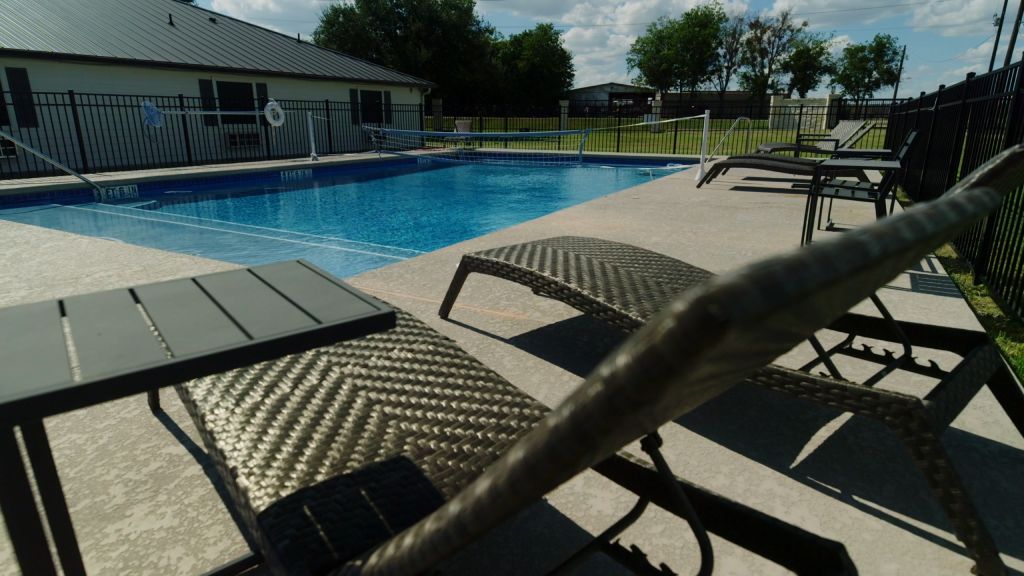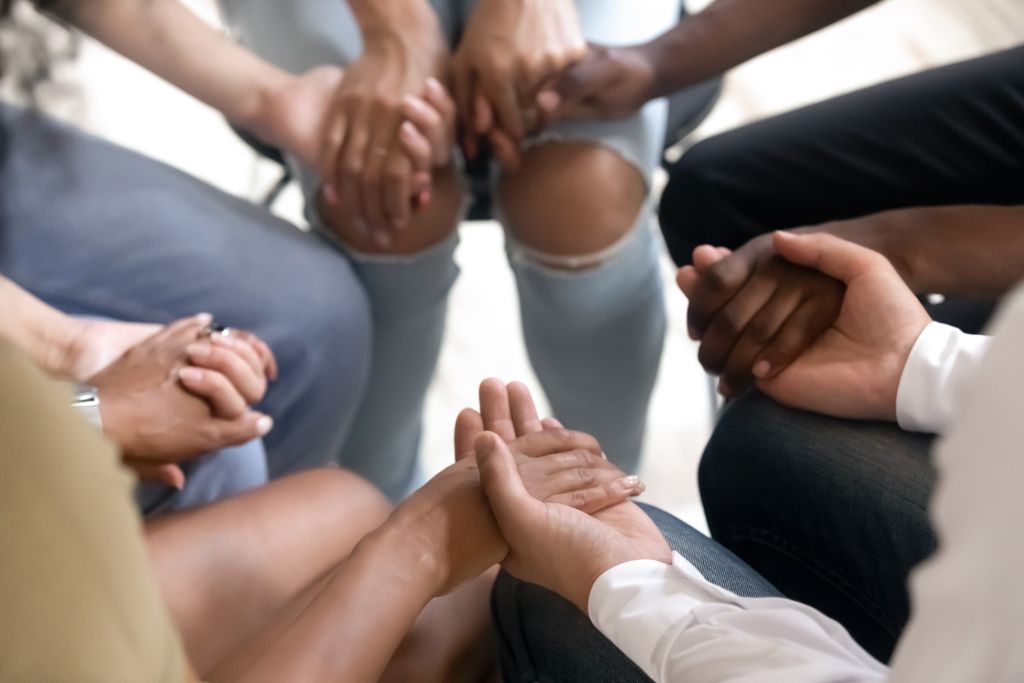Opioid Treatment in Austin, Texas
Opioid Treatment in Austin, Texas
Getting treatment for opioid misuse and addiction is a life-saving measure. Opioids account for the majority of overdose deaths, making it a serious public health emergency. That’s why addiction treatment facilities like Infinite Recovery are working hard to combat opioid addiction by helping families across Texas find healing and support.

Compassionate, Comprehensive Opioid Addiction Treatment in Austin
At Infinite Recovery, we provide understanding, compassionate, and comprehensive opioid addiction treatment to families in Austin, Texas. One of the greatest barriers to treatment is distance, and our location is in just the right place to help countless local and out-of-state families and their loved ones find the treatment they need for recovery.
Helping Adults and Families Affected by Opioid Use Disorder (OUD)
Opioid use disorder and addiction can affect anyone at any time. We are dedicated to providing understanding, compassionate, and judgment-free treatment to all who require opioid addiction treatment.
With a combination of psychoeducation and dedicated expert staff, we work to reduce the stigma holding people back from recovery and promote public understanding of this serious mental health condition.
A Personalized Approach to Long-Term Addiction Recovery
We believe that recovery doesn’t stop once treatment is complete. At Infinite Recovery, we believe in taking a comprehensive, full continuum of care approach to recovery. Small group sizes allow for focused and individualized care, including a personalized treatment plan for each client. No two individuals are the same, and treatment at Infinite Recovery is no different.

Understanding Opioid Addiction and Its Impact
Opioid addiction is more common than you think, with about 3 million people in the United States meeting the criteria for OUD. The more publicly available information about opioid use and abuse there is, the better informed the average person is. Knowing the signs of opioid use disorder or addiction can help families and their loved ones quickly get the help they need and prevent overdose deaths.
What Is Opioid Use Disorder (OUD)?
Opioid use disorder (OUD) is a type of substance use disorder where a person’s substance use and abuse causes a significant impact on their daily life. In this case, a person with OUD is dependent or addicted to opioids, a type of prescription painkiller that is derived from or mimics the natural substances found in the opium poppy plant.
A person with OUD or opioid addiction has an overwhelming desire or cravings to use opioids and will experience withdrawal symptoms when they stop using opioids.
Commonly Misused Opiates and Prescription Opioids (Fentanyl, Oxycodone, Methadone)
The terms “opioid” and “opiate” are often used interchangeably, but opioids are used to refer to all substances that bind to the opioid receptors in the brain. Opioids can be natural or synthetic, while opiates are solely derived from the opium poppy plant. Examples of opiates include morphine and codeine.
Most opioids people will come across are prescription opioids used to treat and manage pain. There are hundreds of opioids used in the medical industry, but the most well-known ones are methadone, oxycodone, hydrocodone, and fentanyl.
People can and do become addicted to the opioids they were prescribed to treat an injury, manage chronic pain, or as post-surgical pain management. Although opioids are effective at blocking pain, they carry a risk for misuse and addiction due to the feelings of pleasure and euphoria (high) that they can induce. Doctor oversight and taking opioids exactly as prescribed can reduce the risk of addiction, but misuse is always possible.
Signs, Symptoms, and the Risks of Opioid Overdose
The signs of opioid addiction can often be overlooked, as people with an addiction tend to hide their substance abuse from their loved ones. However, some signs are more difficult to conceal, such as:
- Doctor shopping or pretending to be injured to get more opioids
- Difficulty staying awake or falling asleep at inappropriate times
- Withdrawing from once-enjoyed social activities
- Sudden out-of-character behaviors, such as dramatic mood swings, engaging in risky behaviors, or impulsive actions
- Flushed, itchy skin
- Unexplained needle marks (or tracks) on skin
- Constricted, “pinpoint” pupils
Chronic opioid use can cause several side effects that can impact your physical and mental health, such as:
- Dependence and/or addiction
- Tolerance
- Increased sensitivity to pain
- Nausea, vomiting, and dry mouth
- Confusion
- Depression
- Vein damage (from intravenous use)
- Liver damage
- Constipation
- Hallucinations
- Weight loss
- Dizziness
- Difficulty concentrating or making sound decisions
- Blurred vision
- Emotional instability
The risk of opioid overdose is always present. However, the risk increases when mixing opioids with other drugs (such as benzodiazepines), having underlying breathing disorders, and returning to a high dosage after losing tolerance. An opioid overdose occurs when the drug interrupts the brain and body’s natural drive to breathe. The symptoms and signs of an opioid overdose include:
- Unresponsiveness
- Vomiting or gurgling noises
- Pinpoint pupils
- Slowed, shallow, or stopped breathing
- Limp body
- Very pale and/or clammy skin
- Purple or blue lips or fingernails
- Slowed or undetectable pulse
Any of the above signs constitutes an immediate call for help, as an opioid overdose can turn deadly fast.
Why Choose Infinite Recovery for Opioid Treatment in Austin, TX?
If you are looking for quality opioid rehab in Austin, Infinite Recovery is here to help. With a focus on small group sizes, individualized treatment plans, full care continuum, and dual diagnosis treatment, we strive to be there for each step of our client’s recovery journey.
Call Now: 844 748-4567
Individualized Treatment Plans for Unique Needs
No two people are alike, and neither are their addictions. Our goal is to treat the underlying causes of addiction, not just the addiction itself, to ensure continuous growth and recovery. This involves a customized treatment plan for each client, custom-tailored to meet their unique needs and challenges.
Full Continuum of Care – From Detox to Aftercare
To prevent interruptions or delays in care, we offer each step of treatment from detox to aftercare services. Once you become a client at Infinite Recovery, you become part of our community, and that entitles you to continuous support during treatment and beyond.
Family Support, Education, and Involvement in Recovery
It’s not just clients who require healing, but their families too. That’s why we offer both family therapy and family dynamics therapy, which helps families heal, communicate better, and foster understanding with each other. By involving families in the treatment process, we help them and their loved ones build a toolset for mental healthcare that can be passed on to subsequent generations.
Experienced Clinicians and a Supportive Healing Environment
Our team of expert staff has decades of combined experience in treating opioid addiction, mental health disorders, and dual diagnosis. They work tirelessly to create a warm and safe home-like environment where our clients can recover from addiction in comfort.
Our Opioid Addiction Treatment Programs in Austin

It takes specialized care to treat any addiction, let alone opioid addiction. That’s why our opioid addiction treatment program is specialized to deal with the challenges clients will face in recovery. This includes the initial detox process, treatment, and continued support post-treatment.
Medical Detox and Withdrawal Symptom Management
The first step of any rehab program is detoxification. Our medical detox program is designed to be safe, effective, and comfortable. By utilizing medications such as Ativan, benzos, and Suboxone, clients can better manage withdrawal symptoms, eliminating unnecessary pain and facilitating physical recovery. Once a client has fully detoxed, they can move on to a treatment program best suited for them.
Residential Treatment and Structured Rehab Programs
For clients with a moderate or severe opioid addiction, residential treatment is the next step in recovery. Our inpatient rehab program is designed to be comfortable and home-like, with several amenities such as a pool, an on-site gym, chef-prepared meals, and a computer lab. Clients spend several hours a day in treatment with plenty of time for relaxation and recreation. Most clients spend 30 days in inpatient care before stepping down to a partial hospitalization program (PHP), which provides extra support for newly sober individuals.
Outpatient Treatment and Intensive Outpatient Programs (IOP)
An outpatient program is designed to give clients access to the treatment they need while remaining flexible enough to suit most schedules. Clients are often eager to return to work, school, and home, and outpatient programs allow them to do so with added support. Our intensive outpatient treatment program is used to help clients navigate a stressful world as they get settled into their new, sober lives.
Short-Term and Long-Term Treatment Options
Opioid addiction is a lifelong process that takes careful planning to be successful. In the short term, detoxification and immediate treatment are effective. However, to make recovery last, long-term treatment must also be included. This can include outpatient treatment, community assistance, and medication-assisted treatment. By having several options available, we are best able to serve and assist any clients who seek our help.
Medication-Assisted Treatment (MAT) and Supportive Therapies
When it comes to medication-assisted treatment (MAT), what a client needs can vary. MAT is the process of using medications to assist clients who are dealing with mental and physical symptoms of a mental health disorder, such as antidepressants to help those with a mood disorder.
Although these can be useful in treating co-occurring mental health disorders, opioid addiction requires the help of specialized medications to manage opioid withdrawal and cravings.
Safe Use of Suboxone, Buprenorphine, and Methadone When Appropriate
Suboxone, buprenorphine, and methadone are all medications used to control withdrawal symptoms and block the high one would get from abusing opioids. This helps keep clients sober and is always administered by a medical healthcare professional. Clients don’t remain on these medications forever and will eventually wean off them as their treatment progresses.
Naloxone Access and Overdose Prevention Education
We are well aware of the signs of overdose and always keep naloxone on hand. One of our goals is to educate clients, their families, and the public about the dangers of opioid overdose and what to do to prevent them. Part of this is advocating for the carrying of naloxone emergency kits and how to effectively use them.
Cognitive-Behavioral Therapy (CBT) and Motivational Interviewing (MI)
Besides MAT, clients make use of clinical psychotherapies. Cognitive-behavioral therapy (CBT) is used to help clients identify and change harmful thought and behavioral patterns, while motivational interviewing (MI) helps clients self-motivate to make lasting, positive change. The inclusion of both therapies is the key to driving personal growth and encouraging healthier coping strategies.
Individual Therapy, Group Therapy, and Family Therapy Sessions
Infinite Recovery is more than individual therapy. We believe that peers and family can play a crucial role in recovery, facilitating mutual healing and support. Because of this, we have family and group therapy options alongside individual therapy to offer well-rounded and comprehensive treatment.
Relapse Prevention, Aftercare, and Ongoing Support

Having access to support services can be the difference between continued sobriety and relapse. That’s why Infinite Recovery continues to provide care beyond treatment and serves as a community hub for our alumni. Once you are a part of Infinite Recovery, you always have a place to return to when in need.
Support Groups and Community Engagement
We work to drive community engagement and make critical resources like support groups easily accessible for our clients and alumni. It’s not always work, as there’s always local exciting sober events happening in the local community to foster companionship and celebrate sober living.
Alumni Programs and Recovery Mentorship
Nobody is ever alone at Infinite Recovery, including our alumni. Alumni programs offer opportunities to make friends, achieve personal goals, or find a mentor to guide you through sober living. This buddy system offers assistance to new alumni, helping them avoid the common pitfalls that one can face post-treatment.
Wellness-Focused Care for Long-Term Well-Being
Infinite Recovery has a holistic treatment philosophy, which requires equal attention to be given to mental, physical, and spiritual health. By increasing an individual’s overall wellness, they become best equipped to deal with difficulties and stress, which prevent relapse.
This takes several forms, such as teaching clients how to create a healthy meal plan, instilling the joy of exercising, or encouraging self-expression.
Admissions, Referrals, and Insurance Coverage
Our main goal at Infinite Recovery is to make quality and compassionate mental health care available to all who need it. As a result, we work closely with clients to remove common barriers to treatment so they can get the help they deserve.
Quick and Compassionate Admissions Process
Our admissions process is quick and easy, often only taking 30 minutes to complete. Potential clients can fill out the contact form or call to begin the admissions process. There’s always a judgment-free and compassionate staff member available to answer questions or offer further assistance.
How to Refer a Loved One or Family Member for Help
Our intervention program helps families get their loved one the referral they need for addiction treatment. If you’d like to plan an intervention for your loved one, contact us, and we will help you plan out the next steps to take.
Healthcare and Insurance Options for Opioid Treatment in Austin
We are proud to accept most major health insurance providers to cover treatment at Infinite Recovery. If you are still in need of help, we can offer further assistance such as financing options, enrolling in insurance plans, and more. You can get started by verifying your insurance benefits here.
Start Your Journey to Opioid Addiction Recovery Today
Anyone can recover from opioid addiction, including yourself and your loved ones. Nobody deserves to struggle with addiction, so let us help you and your family break free from addiction.
Call Our Austin Addiction Treatment Center for Help Now
We accept phone calls until 11 pm seven days a week. Calls made after 11 pm are forwarded to a technician who will call back as soon as we open the next day. For serious emergencies, please call 911.